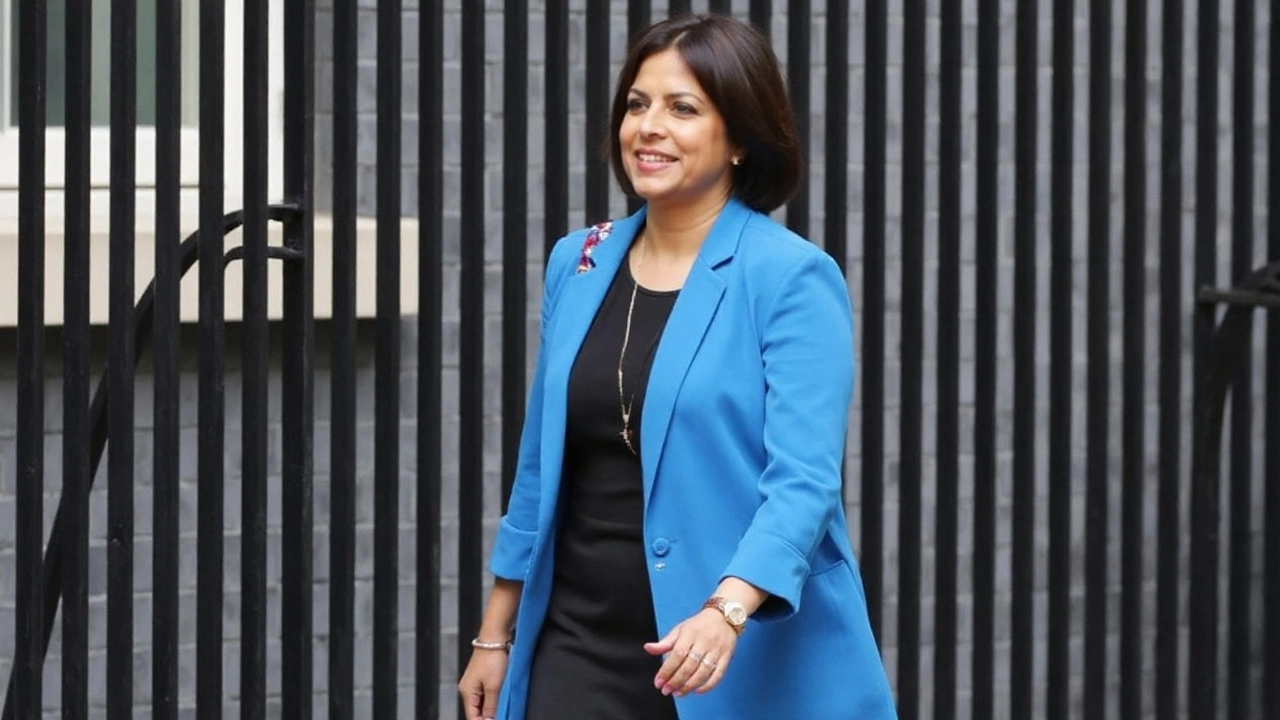Shabana Mahmood has stepped into one of the toughest jobs in British public life. Appointed Home Secretary on September 5, 2025, she becomes the first Muslim woman to lead the Home Office, taking the reins amid a heated debate on immigration, policing, and national security. Her arrival follows a cabinet shake-up triggered by Deputy Prime Minister Angela Rayner’s resignation, a political jolt that forced Prime Minister Keir Starmer to reset his top team.
Mahmood is not a newcomer to heavy reform. As Justice Secretary and Lord Chancellor from July 2024 to September 2025, she pushed through plans aimed at easing the prison overcrowding crisis and cutting the courts backlog. That stint matters now: the Home Office and Ministry of Justice are two sides of the same system. Decisions on policing and borders ripple into courts, prisons, and probation. Mahmood knows how the gears mesh—and where they grind.
Her personal story tracks closely with the modern UK. Born in Birmingham in 1980 to Pakistani parents from Mirpur, Azad Kashmir, she spent parts of her childhood in Saudi Arabia before returning to Britain. She studied law at Lincoln College, Oxford, qualified as a barrister in professional indemnity, and entered Parliament in 2010 as MP for Birmingham Ladywood. That mix of legal training, city politics, and cabinet reform experience now meets a famously unforgiving brief.
A reshuffle with real stakes
The timing is brutal. The Home Office faces record Channel crossings, swelling asylum accommodation costs, and a migration debate that shapes almost every other domestic argument—housing pressures, local services, wages, and social cohesion. Mahmood replaces Yvette Cooper, whose time in the role brought a tougher edge: stricter rules on asylum seekers, a harder line on public order, and inquiries into grooming gangs. Supporters called those moves overdue. Critics warned of overreach and legal risks. Mahmood inherits both the tools and the controversy.
Politically, she sits in Labour’s “blue Labour” tradition—careful on culture, focused on work, community, and nation. That stance could matter on two fronts. First, it signals she may back firm border control paired with integration and civic responsibility. Second, it gives her space to talk safety and order without losing Labour’s reform pitch. In short: steadier rhetoric, tighter enforcement, and practical fixes that can survive the courts.
This role is also symbolic. As the most senior Muslim woman in government, Mahmood’s appointment marks a milestone for representation in a department long associated with security, border control, and the politics of identity. The test for her will be to keep that symbolism in the background while delivering measurable results—fast.

The in-tray: immigration, policing, security
What lands on her desk first? The same problems that have soaked up ministerial time for years, but with sharper deadlines and thinner margins.
- Small boats and asylum: Crossings in the Channel continue to drive the news cycle. Mahmood must reduce arrivals, clear backlogs, cut hotel use, and find lawful, humane alternatives for accommodation. Returns agreements, faster processing, and stronger border operations are the levers—none easy, all urgent.
- Community safety and policing: Forces face budget pressures, retention problems, and a trust gap. Mahmood will have to square visible neighborhood policing with serious crime demands, from knife crime and organized gangs to fraud and online exploitation.
- Public order and protest: A year of large demonstrations stretched police capacity and tested the line between free expression and intimidation. Expect clearer guidance on protest conditions, faster charging decisions, and tighter coordination with prosecutors.
- Counter-terror and extremism: Oversight of MI5 puts daily risk judgments on her desk. The Prevent strategy, proscription decisions, and online radicalization need constant tuning, with civil liberties always in the balance.
- Border tech and enforcement: Biometrics, data-sharing, and casework automation can speed up decisions if done well—and cause legal chaos if done badly. Mahmood’s Justice background suggests she’ll push for clean data, fewer errors, and defensible procedures.
Her experience with prisons and courts could shape Home Office fixes. Expect a push to tighten the flow across the system: quicker initial asylum decisions, faster removals where claims fail, and clearer thresholds for detention. On policing, watch for targets that measure outcomes people feel—response times, charge rates for serious offences, and visible patrols—rather than metrics that only look good on spreadsheets.
Where does she differ from her predecessor? Tone and sequencing. Cooper leaned into visible toughness during a fractious year. Mahmood is likely to keep a firm line but stitch it to delivery mechanics—casework timelines, digital systems, and legal defensibility. Less heat, more process, without softening on enforcement.
There’s also the integration piece. Mahmood has backed Starmer’s view that immigration needs controls and a plan for cohesion or the country risks people “living estranged from one another.” Expect practical moves: English language provision linked to work, support for councils under pressure, and tighter rules for employers who undercut wages. Not dramatic headlines, but the kind of groundwork that lowers tensions.
On asylum accommodation, the immediate ask is to end expensive hotel use. Alternatives—smaller sites, repurposed buildings, partnerships with councils—require local consent and quick funding decisions. Mahmood will need to cut deals that avoid months of legal wrangling and community stand-offs. Speed matters; so does respect for local leaders who carry the backlash.
Public order is another minefield. Police have asked for clearer thresholds on when protests tip into intimidation, and for legal cover when enforcing conditions. Ministers want to avoid court defeats that make enforcement look chaotic. Mahmood’s likely move: tighter, clearer guidance, better evidence gathering, and early engagement with prosecutors to avoid cases collapsing later.
Security never leaves the inbox. Threat levels shift fast, from lone actors to organized networks. Cyber-enabled crime and state-backed interference blur lines between policing, intelligence, and regulation. The Home Secretary’s job is to keep the legal toolkit current—investigatory powers, data access, and encryption challenges—while defending privacy and avoiding mission creep.
She will also face hard calls on proscription. The last year saw fierce arguments over whether activist groups crossed the line into extremist support. Proscription is a blunt instrument. Use it without airtight evidence and you invite court defeats. Use it too slowly and you lose public confidence. Expect Mahmood to demand a higher evidential bar and tighter coordination with the Attorney General before moving.
Then there’s fraud—Britain’s most common crime. It drains family savings and small business cash, yet often sits low on force priorities. If Mahmood shifts resources toward complex economic crime units and gives victims simpler reporting and recovery routes, she could show early wins that matter to millions.
Her political capital will be tested inside Labour too. Blue Labour instincts play well in constituencies worried about order and wages. But the party’s left will push on civil liberties, detention limits, and protest rights. The trick is to frame enforcement and fairness as the same task: the state acts clearly, quickly, and within the law—no theatrics, no shortcuts.
What would count as success in year one? Fewer small boats and faster asylum decisions; hotel use falling; a visible lift in charge rates for serious offences; steadier protest policing with fewer violent flashpoints; and no major legal defeats that unravel policy. Add to that a sense among councils and police chiefs that the Home Office is listening and paying on time.
None of this is headline-grabbing. It is grind. But Mahmood’s CV suggests she is built for grind. At Justice, she focused on system capacity and procedural fixes while pushing legislation to ease prison pressure. At the Home Office, the same approach could deliver: target the bottlenecks; cut the errors; keep the tone calm; and put outcomes ahead of rhetoric.
And the milestone? It’s real, and it will be talked about. But the Home Office does not hand out easy symbolic victories. The department measures you in case files cleared, boats stopped, suspects charged, and threats managed. That is the ledger Mahmood now owns.
